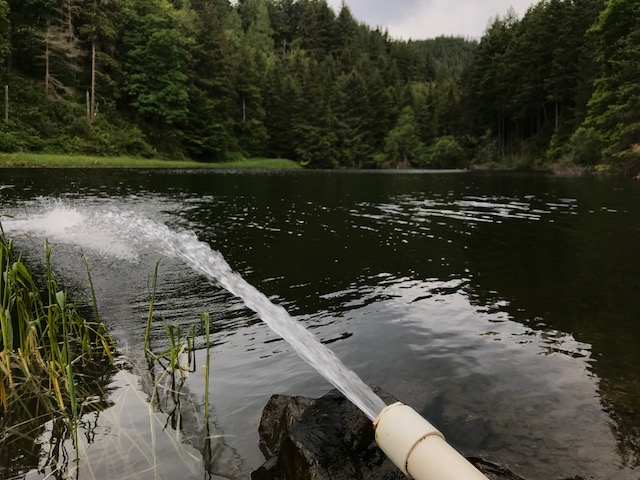You may have noticed the signs at the Swim Lake and Cabana stating, “No dogs allowed.” This is a requirement of our drinking water Sanitary Control Area, as the reservoir and Swim Lake are sources for your drinking water.
pumping water back from the swim lake to the reservoir
Both bodies of water are connected by a pump-back line that circulates water from the mouth of the Swim Lake to the upper reservoir. This improves mixing in the lake and reduces the potential for algae blooms. In addition, the Swim Lake is a backup source of water should something fail at the reservoir. This is the reason why that State Department of Health recommends a “no domestic animal” policy around the LISE lakes.
Dog poop is a public health issue
According to Washington Department of Ecology, “Dog poop is more than just an icky nuisance. It’s a health risk to dogs and people, especially children. It’s full of bacteria that can make people sick. And it’s a source of water pollution. When it rains, dog poop melts away and runoff carries it to storm drains, ditches, and streams that feed rivers, lakes, and marine waters.” [1]
“Fecal coliform in dog feces is one of the biggest contaminants found in Whatcom County waters,” according to Lee First of RE Sources, quoted in the Bellingham Herald in April 2017. [2]
The City of Bellingham reports that pet waste can contain disease-causing organisms, including roundworms, Giardia, Salmonella, E. coli, Cryptosporidium, Toxoplasma and Parvovirus. Even when pet waste looks like it has washed away, many of these pathogens can survive for days, weeks or months in soil and water waiting for a host. People can come into contact with pathogens found in pet waste while playing in grass, swimming, fishing, or boating. [3]
LISE Sanitary Control Area
What is a Sanitary Control Area?
The Sanitary Control Area is the first line of defense to prevent contaminants from entering your drinking water system. This is the area that collects and transports water and potential contaminants to your drinking water source. Scenic Estates is required to control and monitor this Sanitary Control Area regularly to ensure that land use and activities do not threaten your drinking water source.
Thank you for keeping your domestic animals away from the Swim Lake and reservoir. This is something we can do as a community to keep our drinking water safe and healthy.
The specific LISE rule for dogs is Article 5.1.3. www.LISECC.com/part5/section5-1
References
[1] Washington State Department of Ecology. What you can do to manage animal waste [online] Available at www.ecology.wa.gov/About-us/Get-involved/What-you-can-do/Washington-Waters-ours-to-protect/Manage-animal-manure [Accessed 6 June 2018].
[2] Mittendorf, R. (2017) Bellingham Herald. Those bags of dog poop you see along trails? Others hate them, too. [online] Available at www.bellinghamherald.com/news/local/article146011309.html [Accessed 6 June 2018].
[3] City of Bellingham, Washington. Pet Waste Belongs in the Trash. Available at www.cob.org/services/environment/stormwater/Pages/pet-waste.aspx [Accessed 6 June 2018].






